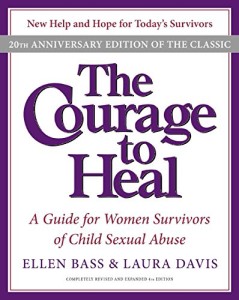From The Courage to Heal by Ellen Bass and Laura Davis
 It is never helpful to tell a survivor of child sexual abuse that she needs to forgive the person who abused her. This advice minimized and denies the validity of her feelings. Yet the issue of forgiveness is one that is pressed on survivors again and again.
It is never helpful to tell a survivor of child sexual abuse that she needs to forgive the person who abused her. This advice minimized and denies the validity of her feelings. Yet the issue of forgiveness is one that is pressed on survivors again and again.
People may urge you to forgive for a variety of reasons. They may believe that you’ll feel better if you forgive. They may assume that forgiveness will speed your healing process and free you to live in the present. They may be uncomfortable with intense feelings of anger and grief or may not want to face the harsh realities of child sexual abuse. Their religion may teach that forgiveness is essential. Yet even if the people around you believe that they have your best interests at heart, you should not let anyone talk you into trading your honest feelings for the “higher good” of forgiveness.
In fact, trying to force forgiveness can be dangerous. We’ve seen many instances where survivors have been urged to forgive before they’ve had a chance to grieve or express their anger. In trying to comply, they have turned their anger inward, becoming seriously depressed or even suicidal…
But you are not more moral or spiritually evolved if you forgive. If there is such a thing as divine forgiveness, it’s God’s job, not yours. If compassion and forgiveness arise naturally, they can be a powerful part of your healing, but not if they’re forced-or rushed-because you think you should feel them.
